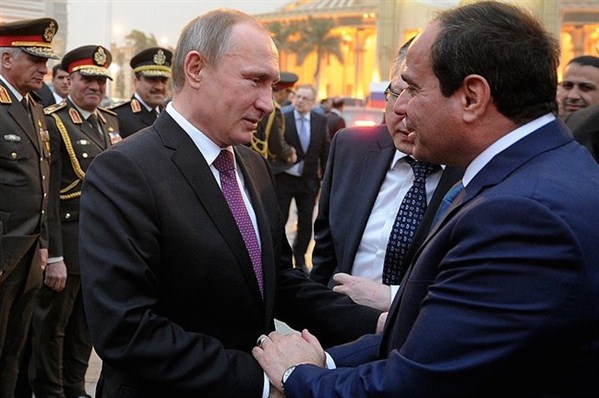It has been a busy week for Egyptian President Abdel-Fattah el-Sissi. On Monday, he had to apologize to his Gulf Arab patrons for a leaked audio recording, purportedly of him and two of his generals mocking the oil-rich monarchies and scheming how to squeeze them for billions. “Man, they have money like rice,” says a man identified as el-Sissi on the alleged recording, which revealed more than just the scorn Egypt’s junta has for its foreign backers and for everyday Egyptians. As the Egyptian blogger known as Baheyya wrote, in the “frank, relaxed banter,” Egypt’s current ruler and two of his closest aides “generally come off as money-grubbing hirelings ready to deploy military force anywhere in exchange for cash.”
Later that day, el-Sissi’s attention turned to another ally, Russian President Vladimir Putin, who arrived in Cairo for a two-day visit. Welcomed by sycophantic banners and newspaper spreads, Putin dined with el-Sissi, joined him at the opera and presented him with the gift of an AK-47. The pageantry and praise heaped on Putin, as The Washington Post’s Erin Cunningham reported, was another sign of the reactionary political mood in Cairo. “That Egypt’s media sees Sissi, a former head of military intelligence, and Putin as having comparable backgrounds has helped feed the narrative that Russia is far better suited than the United States to be the country’s chief ally,” she wrote.
It wasn’t all optics, either. On Tuesday, Putin announced Russia’s commitment to help Egypt build its first nuclear plant, on the Mediterranean coast near Alexandria. The two strongmen also signed other energy and investment deals, as Russian gas giant Gazprom agreed to supply liquefied natural gas to Egypt. El-Sissi even touted plans for a Russian industrial zone along the Suez Canal, a familiar site for his ambitious but vaguely defined economic development plans.

